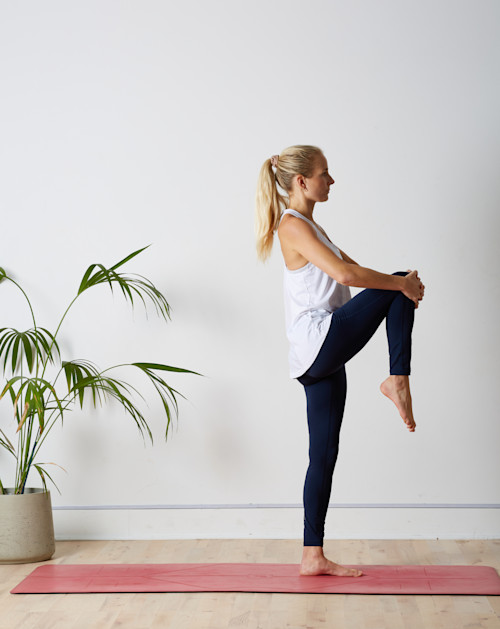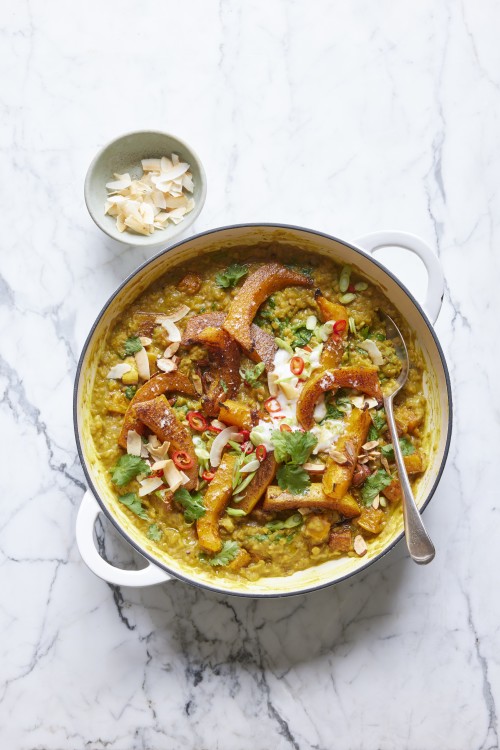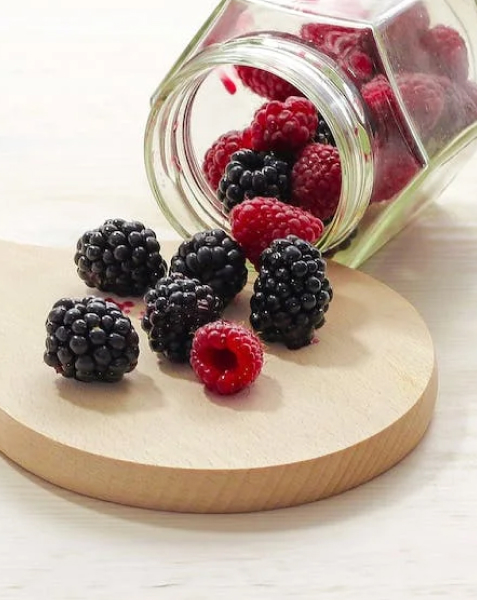We’re constantly targeted with products that promise to keep our skin youthful, glowing, and blemish-free. But the truth is, while the right skincare products for your skin can definitely help, there are a number of other factors that majorly influence the condition of our skin, chief among them being what you eat and drink. So, here’s a breakdown of the intricate link between your diet and your skin, and the key nutritional factors to hit so that you can eat your way to glowing skin.
Gut health
Gut health is having a huge moment in nutrition research and wellness discussions right now, and for good reason. The gastrointestinal (GI) tract, often referred to as the gut, is a complex system that is home to a vast community of microorganisms, collectively known as the microbiome. Much research has revealed that the composition and diversity of the microbiome are linked to a range of facets of physical and mental health, including digestion, immunity, hormone signalling, metabolism, and, you guessed it, our skin (1).
A well-balanced gut microbiome contributes to improved nutrient absorption, enhanced immune function, and reduced inflammation, all of which are essential for healthy skin. Incorporating probiotic-rich foods like yoghurt, kefir, and fermented vegetables can help maintain a harmonious gut environment. Fibre-rich fruits and vegetables (think berries, apples, pears, kiwi, broccoli, carrots, leafy greens) and whole grains (oats, quinoa, barley, brown rice) promote a diverse microbial community in the gut. As your gut flourishes with beneficial bacteria, it reflects positively on your skin, promoting a natural glow from the inside out. So, the next time you reach for a snack, consider that you might be eating your way to that coveted radiant complexion.
If you feel like you need a boost, we highly recommend Symprove, a water-based solution of live and active bacteria for gut support. If you’re curious to know more about gut health and ways to support it, read our article on stress and gut health here.
Antioxidants
Antioxidants are substances both produced by the body and found in foods which play a crucial role in maintaining skin health. They do this by counteracting the effects of free radicals, which are highly energetic particles generated during routine bodily chemical reactions. These free radicals, due to their high energy, initiate oxidative stress when they collide with other molecules in the body. Oxidative stress, in turn, can damage cells and expedite the aging process, leading to the development of fine lines and wrinkles on the skin.
The good news is that a robust body of evidence supports the idea that a diet rich in antioxidants can mitigate the impact of free radicals. Vibrantly coloured plant foods such as bell peppers, carrots, leafy greens, berries, tomatoes, and broccoli, as well as antioxidant-rich sources like cacao and various spices, are all effective in combating oxidative stress. By incorporating these antioxidant-rich foods into your diet, you can proactively prevent premature ageing.
A few antioxidant-rich favourites:
This is one of my go-to smoothies, I love the creamy banana base and the combination of ginger, nutmeg, ground clove, cinnamon. It’s absolutely bursting with flavour, and feels nice and warming thanks to the spices and is so quick to make.
View RecipeA simple, seasonal dish packed with cumin-roasted sweet potatoes, crispy lentils, tenderstem broccoli and a sage salsa verde, with a little chilli to finish. Enjoy as a light supper or as part of a big spread with crusty sourdough, creamy hummus and a peppery side salad.
View RecipeThis traybake is so vibrant — the turmeric gives it a sunny glow, while the cinnamon, parsley and lime add great flavour. We mix coconut yoghurt through the roasted veg to make it irresistibly creamy and serve it with a dollop of hummus and an extra squeeze of lime juice.
View RecipeMy mum and I have been making this for years and we’re still completely obsessed. Massaging the kale may sound strange, but it works brilliantly to soften it, while the tahini, cider vinegar and lime dressing makes it so creamy. We’ve kept it simple here and just added avocado, pumpkin seeds and pomegranates, but it’s delicious with just about anything - I add roasted chilli chickpeas, baked sweet potatoes, sautéed veggies, roast potatoes, rye croutons and anything else I’ve got in my kitchen!
View RecipeThe perfect way to warm up on a cold winter evening, this spiced rich and creamy mug of cocoa has a gentle kick (depending on how generous you are with the chilli powder) — hot chocolate doesn't get much better than this.
View RecipeThis easy soup is as good as it gets — incredibly flavoursome and so simple to make. You’ll be making it on repeat in no time! It's perfect for batch cooking, meaning instant lunches all week.
View RecipeVitamin C
Seen vitamin C skincare products trending on your social feed? Well, it’s for good reason. This essential nutrient plays a pivotal role in stimulating collagen production, imparting strength and elasticity to your skin. In other words, it keeps skin looking dewy, and minimises the appearance of fine lines, wrinkles, and dark blemishes. As a powerful antioxidant, vitamin C also actively helps neutralise and eliminate oxidants, whether they arise from natural body processes or come into contact with your skin from external sources like pollutants or sun exposure (2). Beyond that, scientific research suggests that vitamin C may also support the body’s healing abilities, aiding in wound healing and minimising scarring (3). To boost your vitamin C intake, incorporate a variety of brightly coloured fruits and vegetables into your diet, such as peppers, strawberries, citrus fruits, broccoli, cranberries, and cherries. By regularly enjoying these different plants, you’ll be providing your skin with the nourishment it needs for a healthy and luminous glow.
Bonus tip:
The advantages of consuming vitamin C in your diet are further heightened when paired with vitamin E, which brings many of the same beneficial properties. It is another potent antioxidant that plays an important role in reducing inflammation (4). Foods rich in vitamin E include broccoli, spinach, almonds, hazelnuts, sunflower seeds and extra virgin olive oil.
Our top recipes for a vitamin boost:
The perfect fuss-free breakfast. This takes less than 15 minutes to prep the night before, meaning you have the most delicious, nourishing breakfast ready to go as soon as you wake up.
View RecipeWhen it comes to easy comfort food for busy days, this pasta dish is a weeknight winner — the sweet roasted peppers combined with soft orzo, make it supremely satisfying, plus it's packed full of flavour. If you don't have orzo, simply swap for risotto rice or pearl barley.
View RecipeFull of textures and delicious flavours, this no-fuss nutritious salad tastes as good as it looks. Team with hummus, guacamole or baba ganoush for a healthy protein-packed meal.
View RecipeThis is one of my favourite, simple soups, packed with greens and seasoned amazingly by the nutritional yeast.
View RecipeThis is a lovely fresh salad that is so simple and speedy to pull together. We love to serve it with a side of roasted sweetcorn & jalapeño dip, but it also tastes delicious with hummus or on its own.
View RecipePasta, sandwiches, salads? Transform most meals with a generous dollop of this herby pesto. The addition of sunflower seeds not only makes it especially creamy, but also provides essential vitamins and minerals, including vitamin E and selenium.
View RecipeThis is an old favourite recipe, which we’ve recently given a revamp to make it even better for you. We’ve swapped the bananas for dates, and used more oats rather than a mix of oats and puffed rice, which we found made the texture even better. They’re sweet and chewy, with lovely bites of nuts and seeds. I make these on busy weeks to have as my on-the-go breakfasts.
View RecipeHealthy Fats
Each skin cell is encased by two layers of fat, and a portion of these fats comes from your diet (5). These dietary fats are not only completely healthy but are also essential for achieving radiant and well-nourished skin. The optimal source of these beneficial fats is omega-3 fatty acids, which not only contribute to maintaining a fresh appearance, but also possess anti-inflammatory properties that can soothe the skin (6). To incorporate more of these essential fats into your diet, turn to avocado, nuts and seeds (as well as nut and seed butters), coconut, olives and extra virgin olive oil.
Our go-tos for a dose of healthy fats:
We're huge fans of avocado toast and this recipe is our new breakfast & lunch go-to. Make sure to use really smooth, runny tahini for this (we love Belazu.) It tastes incredible with just a squeeze of lemon and sprinkled with chilli flakes.
View RecipeWhizz up a satisfying breakfast smoothie in minutes. Packing in plenty of nutritious ingredients, such as spinach, banana, hemp and chia seeds, it will keep you going through until lunchtime.
View RecipeThis is such a simple and delicious dish to make on any weeknight. It's filled with lots of colourful veggies mixed up with some tasty tahini, lemon juice and almond milk. Perfect to top up with a handful of coriander or parsley.
View RecipeThis salad is packed full of so much flavour - it's the perfect side to any dinner spread, or BBQ in the summer time. The acidity of the olives, tastes delicious with the rich olive oil and roasted courgettes.
View RecipeWe love this simple bowl of black beans, rice and veggies drizzled with our creamy avocado magic dressing. Full of protein, fibre, and healthy fats, this main course salad is guaranteed to satisfy.
View RecipeThese tamari almonds are perfect for a savoury snack. I love them sprinkled with a few chilli flakes to add extra spice and flavour.
View RecipeCarotenoids
Dietary carotenoids, the natural pigments responsible for the vibrant colours in fruits and vegetables, play a pivotal role in promoting skin health. Studies have shown that carotenoids, such as beta-carotene found in carrots and lycopene present in tomatoes, can enhance the skin’s resilience against UVB damage, particularly relevant during the summer, helping to prevent sunburn. Not only this, carotenoids provide protection against UVA-induced pigmentation, a factor contributing to premature signs of ageing (7). While carotenoids are by no means a substitute for SPF, inclusion of carotenoid-rich foods in your diet is a great way to support the protection of your skin. Opt for colourful leafy greens like spinach, kale, and Swiss chard, and incorporate orange and red-hued produce such as sweet potatoes, peppers, and watermelon.
Recipes bursting with carotenoids:
This is one of our favourite smoothies in the office. Using frozen fruit and vegetables keeps it extra cold and thick, and means it's super quick to whip up.
View RecipeTucking into this fresh crunchy rainbow salad will no doubt fill work colleagues with envy. The addition of mint, pomegranate and pistachios takes a simple salad up a notch, making it a brilliant workday lunch that’s worth getting excited for.
View RecipeWe love a traybake. Maximum flavour, minimum washing-up! And the oven does most of the work. The spicy, sweetness of veggies coated in maple syrup, paprika, cumin & harissa are deliciously flavourful, and we can’t get enough of the creamy harissa yoghurt with a touch of lime zest.
View RecipeEat the rainbow with this buddha bowl that’s bursting with flavour — a base of quinoa is topped with colourful vegetables and spicy black beans.
View RecipeThis curry is a real favourite in our house at the moment. Roasted aubergine stirred into coconut milk, simmered with lots of spices, sauteed onion, garlic, lime juice and wilted spinach. Perfect with rice, tofu or a baked potato for dinner.
View RecipeImpress at summer barbecues with this vibrant main meal salad. The quinoa and lentils are both excellent sources of plant-based protein and fibre; teamed with bright leafy greens, juicy nectarines, sweet blueberries and crunchy spiced walnuts, this salad is a thing of joy.
View RecipeWater intake
Water is a crucial ally in addressing various skin concerns. Adequate hydration plays a pivotal role in skin elasticity and flexibility, ensuring optimal moisture balance for a supple and radiant complexion. Conversely, dehydration can result in skin dryness, dullness and the accentuation of fine lines and wrinkles. Moreover, water majorly participates in the body’s natural detoxification process (mainly carried out by the liver), promoting the elimination of toxins and enhancing blood flow, which contributes to clear-looking skin The recommended daily water intake varies based on factors like age, gender, and lifestyle, with approximately 2 litres serving as a general guideline. Don’t forget that herbal tea and water-rich foods such as melons, cucumber, oranges, and celery also count towards your daily water intake!
The take-home message
To support the brightness, texture and overall appearance of our skin, maintaining a balanced and varied diet rich in fibre (found in fruits, vegetables, nuts, seeds, beans and legumes), probiotics, and antioxidants is essential. Additionally, staying hydrated, managing stress, and addressing any underlying gut issues can contribute to overall skin wellness.
Please note: this article provides general rather than medical advice, and is targeted at those with normal rather than problem skin. For more serious skin issues or concerns, please consult a GP or dermatologist.
References
1. De Pessemier B, Grine L, Debaere M, Maes A, Paetzold B, Callewaert C. Gut-Skin Axis: Current Knowledge of the Interrelationship between Microbial Dysbiosis and Skin Conditions. Microorganisms. 2021; 9 (2): 353.
2. Pullar JM, Carr AC, Vissers MCM. The Roles of Vitamin C in Skin Health. Nutrients. 2017; 9 (8): 866.
3. Ibid.
4. Nachbar F, Korting HC. The role of vitamin E in normal and damaged skin. J Mol Med (Berl). 1995; 73 (1): 7-17.
5. Alberts B, Johnson A, Lewis J, et al. Molecular Biology of the Cell. 4th edition. New York: Garland Science; 2002. The Lipid Bilayer. Available from: https://www.ncbi.nlm.nih.gov/books/NBK26871/.
6. Simopoulos AP. Omega-3 fatty acids in inflammation and autoimmune diseases. J Am Coll Nutr. 2002; 21 (6): 495-505.
7. Baswan, SM, Klosner, AE, Weir, C, et al. Role of ingestible carotenoids in skin protection: A review of clinical evidence. Photodermatol Photoimmunol Photomed. 2021; 37: 490–504.







































